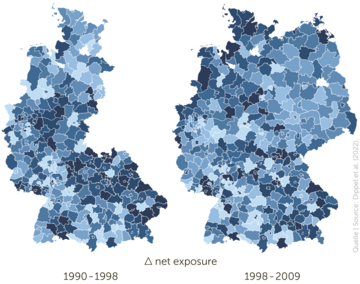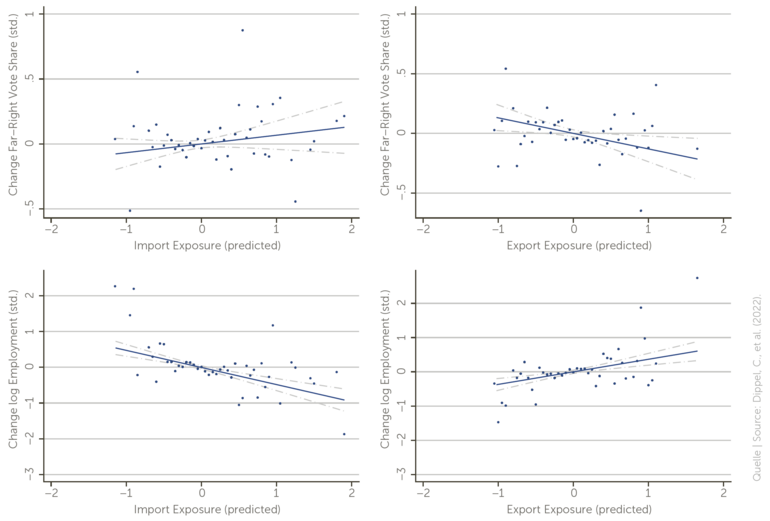Kiel Institute Highlights
It´s all about the labour markets - where globalization spurs populism
How can populism be mitigated? Our study showed that labor market adjustments in response to global competition are the main reason for the political polarization resulting from international trade. Labor market policies can counter the populist backlash against globalization by improving upward mobility of disadvantaged workers. We found pronounced regional differences in the labor market consequences of globalization. Accordingly, labor market policies should be complemented by regional policies that generate development perspectives for regions that have been left behind.

There has been extensive research in recent years into the causes of populism. While cultural factors, e.g., skepticism towards pluralistic societal models or anxieties about losing national identities, do play a role, economic causes have also been identified (a comprehensive overview is given by Guriev and Papaioannou, 2022). Globalization and technological change have contributed to the rise of populist parties and candidates. However, the populist approach to politics has its shortcomings, as the current pandemic reveals. Socially-beneficial policies may well require unpopular measures. Accordingly, populist governments that care more about beliefs and sensitivities than about facts and necessities have performed badly in handling the pandemic (Bayerlein et al., 2021).
Populist parties, particularly those on the right of the political spectrum, tend to pursue a nationalist and protectionist approach to politics that is unlikely to increase aggregate welfare. This raises the question as to how to counter populism effectively. Our recent study (Dippel et al., 2022) contributed to answering this question. The analysis focused on the economic mechanisms that translate discontent with globalization into voting behavior. Looking at the case of Germany, the study showed that labor market adjustments in response to increasing trade with low-wage countries are the main reason for the populist backlash against globalization.
Trade liberalization affects local labor markets very differently
Our study concentrated on Germany’s increasing trade with Eastern Europe and China over the period 1990–2009. Backed by theory and empirically proven, this led to adjustments in the German labor market: manufacturing employment declined, particularly in the low-wage sector. Simultaneously, employment in the service sector increased, as did demand for high-skilled labor. In the aggregate, the German labor market benefited from this development, which leads to more and better jobs (Dauth et al., 2014). However, there are pronounced differences in the actual consequences of trade liberalization on local labor markets, depending on the regional industrial structure.
Figure 1 highlights regional exposure to increasing trade with Eastern Europe and China during the period covered by the analysis. It shows exposure to net imports, i.e., imports minus exports (hereafter referred to as import competition). Overall, many regions benefit from additional export opportunities (light blue). Due to their industry structure, other regions are primarily affected by greater import competition (dark blue). This development has political consequences, as figure 2 reveals. The vote share received by nationalist parties in federal elections increased with regional exposure to low-wage imports (upper left). Support for nationalist parties decreased with regional exposure to rising exports (upper right). The increase in nationalist party support up to 2009 translated into increasing support for the right-wing populist party AfD in recent elections. More detailed analysis reveals the drivers of this development: employees with low qualification levels, particularly from the manufacturing sector, are most likely to increase their support for nationalist parties in response to import competition—i.e., those individuals most affected by labor market adjustments caused by globalization.
As such, globalization’s political consequences (figure 2, upper half) are reflected in globalization’s labor-market effects (figure 2, lower half). Regional employment increases with export exposure but decreases with import exposure. This raises the question as to the extent to which the political consequences of globalization can be explained by its labor-market impacts.
Effects of Im- and Export-Exposure on Employment and Nationalist Party Support

The graphs show the statistical relationship between county-level changes in a) nationalist parties’ vote share/ Import-Exposure (upper left); b) nationalist parties’ vote share/Export-Exposure (upper right); c) log of employment/ Import-Exposure (lower left); d) log of employment/Export-Exposure (lower right).
Polarization is driven by labor-market effects
A novel method allowed us to disentangle the different steps of the causal chain. Our analysis confirmed that increased import competition leads to decreasing employment, specifically in the manufacturing sector, and higher unemployment in local labor markets in Germany. Simultaneously, increased import competition boosts the vote share gained by nationalist parties in federal elections. This political effect of import competition can be fully explained by the labor-market effects of import competition. If trade liberalization only caused labor-market adjustments, the increase in nationalist parties’ vote share would be up to 71 percent higher. However, the polarizing effect of labor-market adjustments in response to international trade is partially off set by trade effects that have a politically moderating impact in the aggregate, e.g., stemming from increasing product diversity or decreasing consumer prices. Counterfactually, without the labor-market adjustments caused by import competition, higher levels of international trade would lead to a decrease in support for nationalist parties.
The study’s political implications are clear (c.f. Gold, 2022). Trade liberalization’s polarizing effect results exclusively from its effects on local labor markets. More precisely, the political consequences of trade liberalization are the result of the inequalities caused by labor-market adjustments in response to import competition. Firstly, high-qualified workers benefit from the structural change triggered by trade liberalization, while workers with lower qualification levels lose out. Secondly, entire regions benefit from the new growth trajectories made possible by structural change, while others are left behind in terms of international competition. To counter the resulting polarization, it is not sufficient to merely compensate the “losers” of structural change financially. Rather, active labor-market policies accompanied by regional policies must empower left-behind regions and individuals to participate in the development perspectives provided by globalization and technological change.
Related publication
References:
Bayerlein, M., et al. (2021). Populism and COVID-19. How Populist Governments (Mis)Handle the Pandemic. Journal of Political Institutions and Political Economy 2 (3): 389–428.
Dauth, W., S. Findeisen und J. Südekum (2014). The Rise of the East and the Far East. German Labor Markets and Trade Integration. Journal of the European Economic Association 12 (6): 1643–1675.
Dippel, C., et al. (2022). Trade Effects on Workers and Voters. The Economic Journal 132 (641): 199–217.
Gold, R. (2021). Wie kann Wirtschaftspolitik zur Eindämmung des Populismus beitragen? Wirtschaftsdienst 101 (7): 500–504.
Gold, R. (2022). From a Better Understanding of the Drivers of Populism to a New Political Agenda. Forum for a New Economy, WP 04-2022.
Guriev, S., und E. Papaioannou (2022). The Political Economy of Populism. Journal of Economic Literature. Forthcoming.